#mymetas
Text
Just finished Good Omens 2 and I'm honestly boggling at the Aziraphale hate because yes, his decision led to the angsty cliffhanger, but it makes SO much sense for his character. Not just in a "Religious brainwashing and sunk-cost fallacy" kinda way but also a "Aziraphale has no reason to believe this isn't the perfect solution" way. That scene among the nebula is crucial because it establishes that Crowley loved being an angel—reveled in his ability to create and allow his creations to grow kinda like plants—and the only problem was that someone else was calling the shots, someone who wouldn't listen to his criticism. Aziraphale has also spent 6,000+ years watching Crowley do good, all the while forced to deny the fact that he's "nice" lest embracing his original nature get him into trouble with hell. Now, Metatron comes along with an offer that fixes everything in one fell swoop. Crowley can be an angel again, be nice without censure, his ideas and criticisms will hold weight because he'll be answering to Aziraphale, and they'll be together.
It strikes me that Aziraphale isn't there when Crowley sees Gabriel's trial, ergo he likewise doesn't see the (non)acknowledgement that there's an institutional problem up in Heaven. There just happen to have been two archangels who called it quits. Same when Gabriel blurts that phrase out to Crowley. Aziraphale has always been more blind to the ways in which Heaven is "toxic" (for very understandable reasons) and this season he's continually sheltered from new evidence of its structural problems. The plot just preaches to the choir: Crowley. He likewise wouldn't see the conflict Gabriel and Beelzebub have caused as evidence of an underlying problem because that's a problem he and Crowley will no longer share. Why would they be worried about Heaven still being unable to accept partnerships between angels and demons when Crowley will no longer be a demon? And that's something he presumably wants based on Aziraphale's memories of him and the ongoing admission that he's lonely.
The way I see it, they got what they thought they wanted at the start of Season 2. Heaven and Hell are keeping an eye on them, but functionally they're left alone. Crowley can spend all the time he wants with Aziraphale and nothing comes of that except that they're both continually named traitors and the higher-ups grumble about it. If Gabriel had never shown up, things should have been perfect based on Crowley's "Let's just run away and have each other's company" standards. Better, even, considering that they get to be together on their beloved Earth, rather than being bored out in Alpha Centauri without any sushi, plants, books, or Bentleys. And yet... Crowley doesn't strike me as particularly happy. Because, you know, based on that kiss he wants to be with Aziraphale, not just literally be with him, but the point of this post is that his "Let's run away and be an 'us'" falls totally flat when he doesn't explain that specific desire to Aziraphale; the desire to change what an 'us' means. From Aziraphale's perspective they're already an 'us.' That was the entire point of "our side" in Season 1 and now they can continue to be 'us' up in Heaven. Plus, Aziraphale likely sees this as a sacrifice on his part. He will give up his bookshop, his Earthly indulgences, take on the responsibilities of leadership (which I don't think he actually wants for a variety of reasons), and spend the rest of eternity in a place where he's felt so small because he thinks that's what Crowley wants. Crowley was happy as an angel. Crowley wanted them to be together without risk of permanent discorporation. They were able to achieve that after not-Armageddon and he still wasn't happy... so surely those two things together will do the trick. Crowley never actually articulates how he wants their relationship to change and the kiss comes much too late, when he's already rejected what Aziraphale must see as a perfect, selfless solution he's secured for them. Even if Crowley wasn't always moving too fast for him, an overture of romance isn't going to go well after that.
Is this crushing and angsty and devastating as a hiatus? Damn straight, my heart it breaking. But it's a good setup. More importantly, it makes perfect sense for their characters, particularly when they're still talking past one another. Aziraphale is someone who has always moved more slowly as a matter of course, as an angel he has remained immersed in the rhetoric of Heaven, his main avenue of breaking free of that (Crowley) has a huge communication problem (to say nothing of his own denial. He only made headway with the help of Nina and Maggie, seconds before Aziraphale shows up), and Metatron (in a no doubt incredibly manipulative manner) has just offered Aziraphale a job that presumably makes him happy AND Crowley happy AND allows him to maintain the moral this-is-how-the-universe-works perspective he's had since he was literally created. Of course he's going to say yes to all that!! And sure, there are problems in Heaven, Aziraphale isn't completely blind, but he can fix them now that he's in charge. How? Well... he'll figure that out later! Kinda like how he's been making plans on the fly this entire season. That seems logical from his perspective, right? It's not like he's gotten a crash-course in the concept of the master's tools never being able to dismantle the master's house...
#Good Omens#Good Omens spoilers#Good Omens 2#Good Omens 2 spoilers#GO2#GO2 spoilers#mymetas#this is so rough and I'll probably write better metas later#but I just have FEELINGS RIGHT NOW OKAY
3K notes
·
View notes
Text
Aziraphale’s Choice, the Job Connection, and Michael Sheen’s Morality
Update: Michael Sheen liked this post on Twitter, so I'm fairly certain there is a lot of validity to it.
I’ve had time to process Aziraphale’s choice at the end of Season 2. And I think only blaming the religious trauma misses something important in Aziraphale’s character. I think what happened was also Aziraphale’s own conscious choice––as a growth from his trauma, in fact. Hear me out.
Since November 2022 I’ve been haunted by something Michael Sheen said at the MCM London Comic Con. At the Q&A, someone asked him about which fantasy creature he enjoyed playing most and Michael (bless him, truly) veered on a tangent about angels and goodness and how, specifically,
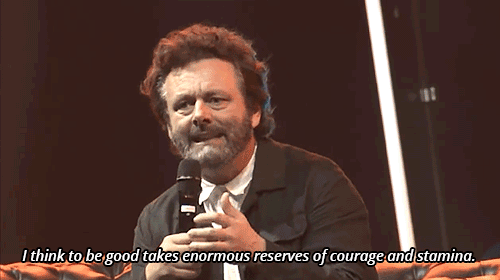
We as a society tend to sort of undervalue goodness. It’s sort of seen as sort of somehow weak and a bit nimby and “oh it’s nice.” And I think to be good takes enormous reserves of courage and stamina. I mean, you have to look the dark in the face to be truly good and to be truly of the light…. The idea that goodness is somehow lesser and less interesting and not as kind of muscular and as passionate and as fierce as evil somehow and darkness, I think is nonsense. The idea of being able to portray an angel, a being of love. I love seeing the things people have put online about angels being ferocious creatures, and I love that. I think that’s a really good representation of what goodness can be, what it should be, I suppose.
I was looking forward to BAMF!Aziraphale all season long, and I think that’s what we got in the end. Remember Neil said that the Job minisode was important for Aziraphale’s story. Remember how Aziraphale sat on that rock and reconciled to himself that he MUST go to Hell, because he lied and thwarted the will of God. He believed that––truly, honestly, with the faith of a child, but the bravery of a soldier.
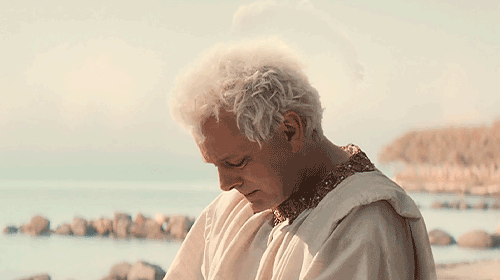
Aziraphale, a being of love with more goodness than all of Heaven combined, believed he needed to walk through the Gates of Hell because it was the Right Thing to do. (Like Job, he didn’t understand his sin but believed he needed to sacrifice his happiness to do the Right Thing.)
That’s why we saw Aziraphale as a soldier this season: the bookshop battle, the halo. But yes, the ending as well.
Because Aziraphale never wanted to go to Heaven, and he never wanted to go there without Crowley.
But it was Crowley who taught him that he could, even SHOULD, act when his moral heart told him something was wrong. While Crowley was willing to run away and let the world burn, it was Aziraphale (in that bandstand at the end of the world) who stood his ground and said No. We can make a difference. We can save everyone.

And Aziraphale knew he could not give up the ace up his sleeve (his position as an angel) to talk to God and make them see the truth in his heart.
I was messed up by Ineffable Bureaucracy (Boxfly) getting their happy ending when our Ineffable Husbands didn’t, but I see now that them running away served to prove something to Aziraphale. (And I am fully convinced that Gabriel and Beelzebub saw the example of the Ineffables at the Not-pocalypse and took inspiration from them for choosing to ditch their respective sides)
But my point is that Aziraphale saw them, and in some ways, they looked like him and Crowley. And he saw how Gabriel, the biggest bully in Heaven, was also like him in a way (a being capable of love) and also just a child when he wasn’t influenced by the poison of Heaven. Muriel, too, wasn’t a bad person. The Metatron also seemed to have grown more flexible with his morality (from Aziraphale's perspective). Like Earth, Heaven was shades of (light?) gray.
Aziraphale is too good an angel not to believe in hope. Or forgiveness (something he’s very good at it).
Aziraphale has been scarred by Heaven all his life. But with the cracks in Heaven’s armor (cracks he and Crowley helped create), Aziraphale is seeing something else. A chance to change them. They did terrible things to him, but he is better than them, and because of Crowley, he feels ready to face them.
(Will it work? Can Heaven change, institutionally? Probably not, but I can't blame Aziraphale for trying.)
At the cafe, the Metatron said something big was coming in the Great Plan. Aziraphale knows how trapped he had felt when he didn’t have God’s ear the first time something huge happened in the Big Plan. He can’t take a chance again to risk the world by not having a foot in the door of Heaven. That’s why we saw individual human deaths (or the threat of death) so much more this season: Elspeth, Wee Morag, Job’s children, the 1940s magician. Aziraphale almost killed a child when he couldn’t get through to God, and he’s not going through that again.
“We could make a difference.” We could save everyone.

Remember what Michael Sheen said about courage and doing good––and having to “look the dark in the face to be truly good.” That’s what happened when Aziraphale was willing to go to Hell for his actions. That’s what happened when he decided he had to go to Heaven, where he had been abused and belittled and made to feel small. He decided to willingly go into the Lion’s Den, to face his abusers and his anxiety, to make them better so that they would not try to destroy the world again.
Him, just one angel. He needed Crowley to be there with him, to help him be brave, to ask the questions that Heaven needed to hear, to tell them God was wrong. Crowley is the inspiration that drives Aziraphale’s change, Crowley is the engine that fuels Aziraphale’s courage.
But then Crowley tells him that going to Heaven is stupid. That they don’t need Heaven. And he’s right. Aziraphale knows he’s right.
Aziraphale doesn’t need Heaven; Heaven needs him. They just don’t know how much they need him, or how much humanity needs him there, too. (If everyone who ran for office was corrupt, how can the system change?)
Terry Pratchett (in the Discworld book, Small Gods) is scathing of God, organized religion, and the corrupt people religion empowers, but he is sympathetic to the individual who has real, pure faith and a good heart. In fact, the everyman protagonist of Small Gods is a better person than the god he serves, and in the end, he ends up changing the church to be better, more open-minded, and more humanist than god could ever do alone.
Aziraphale is willing to go to the darkest places to do the Right Thing, and Heaven is no exception. When Crowley says that Heaven is toxic, that’s exactly why Aziraphale knows he needs to go there. “You’re exactly is different from my exactly.”
____
In the aftermath of Trump's election in the US, Brexit happened in 2018. Michael Sheen felt compelled to figure out what was going on in his country after this shock. But he was living in Los Angeles with Sarah Silverman at the time, and she also wanted to become more politically active in the US.
Sheen: “I felt a responsibility to do something, but it [meant] coming back [to Britain] – which was difficult for us, because we were very important to each other. But we both acknowledge that each of us had to do what we needed to do.” In the end, they split up and Michael moved back to the UK.
Sometimes doing the Right Thing means sacrificing your own happiness. Sometimes it means going to Hell. Sometimes it means going to Heaven. Sometimes it means losing a relationship.
And that’s why what happened in the end was so difficult for Aziraphale. Because he loves Crowley desperately. He wants to be together. He wanted that kiss for thousands of years. He knows that taking command of Heaven means they would never again have to bow to the demands of a God they couldn’t understand, or run from a Hell who still came after them. They could change the rules of the game.
And he’s still going to do that. But it hurts him that he has to do that alone.
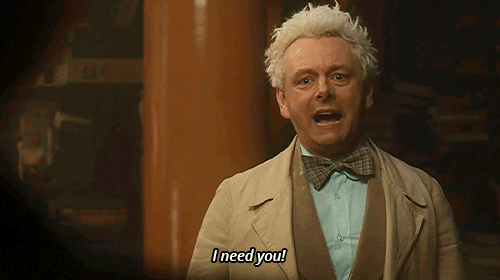
#good omens#good omens 2#ineffable husbands#it's kinda like capt america: civil war#with Azi as Tony Stark: traumatized and trying to do the right thing#and Crowley being Steve Rogers: fuck the establishment let's go rogue#gos2spoilers#good omens meta#good omens 2 meta#go s2#michael sheen#go s2 meta#go meta#*mine#*mymeta#ineffables husbands#ineffable soulmates#*mybest
11K notes
·
View notes
Text
ngl with how heavy-handed Fionna and Cake is presenting the themes of Simon doing dad-coded stuff,
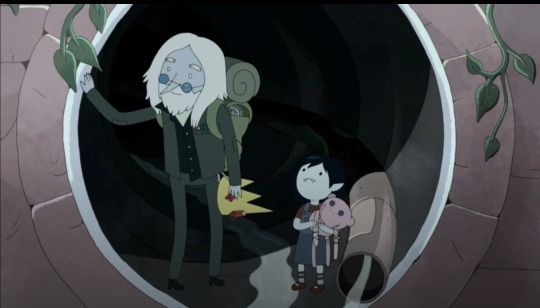
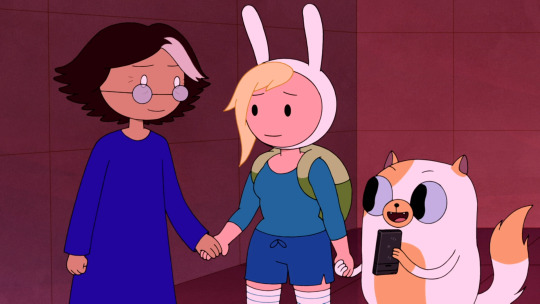
and obviously wanting to be a dad,
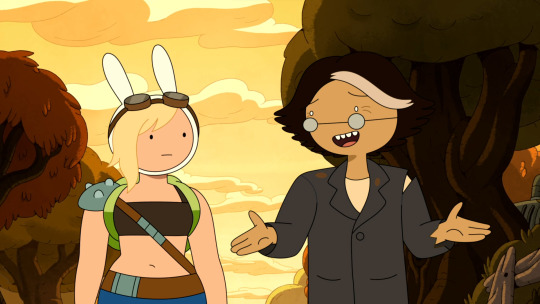
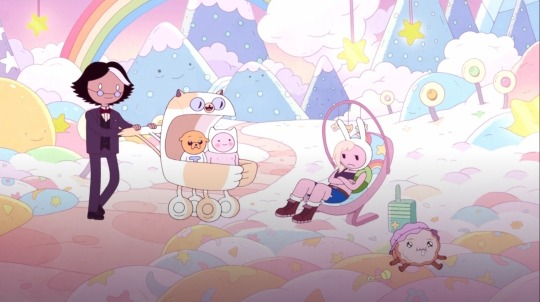
I wouldn't be surprised at all if it was all building to something. To what, I don't know yet. But I feel it has to be something.
2K notes
·
View notes
Text
Regarding #EndOTWRacism’s summaries of 2023 OTW Board election candidate positions
Before I begin, let me say now that while I am a volunteer with the OTW, my views are personal and should not be taken as any kind of official statement from the org, its leadership, or other volunteers, especially not the candidates in question. My focus here is on the Asian candidates for obvious reasons, but this post is not meant as endorsement or disavowal of any of the candidates, whose bios and platforms can all be read here.
Do not take this as an excuse harass the mods running EOTWR. I cannot make myself clearer.
--
I am making this post to express my extreme disappointment with End OTW Racism’s post purporting to summarize the platforms of the candidates for the upcoming Board elections. It is no longer rebloggable, but can be read here.
The way that the candidates with Asian names were spoken of is deeply insulting when compared with how candidates with English-language names were discussed. Asian candidates had their platforms misrepresented, their expertise downplayed, and their lived experiences reduced down to “bringing an international presence” to the board, which was then further caveated with, “diversity alone is not going to solve the issue of racist harassment currently allowed in the OTW’s policies and enforcement practice”. While it is true that diversity alone is not a solution, it’s pretty offensive to essentially have “remember! Just because they aren’t white doesn’t mean you should vote for them!” tacked on to one of the Asian candidates’ platforms.
End OTW Racism seems more concerned with whether or not candidates used the buzzwords they wanted to hear rather than with how racism is discussed holistically within the statements. While I can appreciate that EOTWR has a specific agenda, to say things like, “[s]he does not mention racism, racist harassment, or hiring a DEI consultant in her platform, so outside the outreach and support she mentions, there is not enough for us to conclude that these would be priorities for her” regarding Zixin Z.’s position, directly following the statement, “[s]he also mentions the need for outreach towards non-English-speaking fans and has a desire to provide support to volunteers from minority groups” is fucking laughable, especially after the initial mistake of stating that Zixin Z. only wanted to do more outreach to Chinese-speaking fans. Again, I understand that people make mistakes and that this mistake has since been corrected, but I hope it prompts some reflection on the sort of biases that would lead to such a mistake in the first place. It may have been completely innocuous, but in charged discussions about racism, please understand that it gives an impression that is difficult to shake. I do thank you for not trying to hide that this happened.
Why is Anh P.’s lack of discussion on TOS/PAC a point against her, while Zixin Z.’s years of experience on PAC, her role as a mod on Weibo, and her background in nonprofits don’t even warrant a mention? For that matter, why did none of the Asian candidates’ skills or experience warrant mention? Qiao C. and Zixin Z. have both been volunteers with the organization for several years now, and Anh P. has years of moderation and volunteer experience elsewhere prior to her work with the OTW.
It is so fucking frustrating that despite each one of these candidates specifically talking about the need for diverse voices, they had their platforms essentially passed over because they didn’t use the right words, and it is particularly fucking aggravating to see that EOTWR will use Chinese issues as props when trying to press OTW leadership on the racism that occurs within the org, but then completely fail to connect the dots on why these candidates are running because the wrong language was used. Zixin Z. is one of the Weibo mods, for fuck’s sake.
The entire post feels like an exercise in virtue signalling, from every time it was brought up that a candidate did not provide pronouns in their platform statements, despite every one of them having pronouns provided in their bios (why mention this detail at all? You could have simply used the pronouns), to what felt like willful obliviousness to the anti-racism stances in the Asian candidates’ platforms. It feels like the concern starts and ends with racism in Anglophone terms, on Anglophone terms.
I can respect the driving ideas behind EOTWR, even if I disagree with the way that EOTWR pursues their goals. I do believe that we want the same things in the end, and therefore chose not to interact with the many posts I have seen about the protest. However, I saw the summary post and could not let it pass without speaking.
For a protest group supposedly dedicated to ending racism in the OTW, this felt incredibly hypocritical, conscious bias or not. In my most charitable frame of mind, I can see this as misjudging and overcorrecting to ensure that there was no favoritism shown to the obvious non-white candidates lest EOTWR be accused of tokenizing– again, it is true, that diversity in and of itself is not a solution to racism.
In my least charitable and most bitter frame of mind, I feel inclined to wonder if EOTWR, much like the OTW itself, is uncomfortable with the lack of influence they could exude over an international candidate. It would be much, much easier to push their agenda forward with more culturally familiar candidates, particularly white ones. Guilt and public scrutiny are powerful weapons and easy to wield against those with perceived privilege in our current atmosphere, often to the detriment of the actual discussion at hand in my experience. I know that’s cynical. It’s hard not to be. (For clarity's sake: I do not know the other candidates' races. This is a hypothetical.)
This isn’t a demand for an apology. I think we fetishize the capital-A Apology to the point where I find them sort of meaningless unless they are given freely. I don’t need EOTWR to agree with me, and I don’t really want to keep talking about it. Rather, I would prefer that EOTWR take action to do better as they continue in their campaign. What that action is is their decision. If they truly mean to stand against racism in the OTW, then I’d like them to demonstrate it.
--
DO NOT HARASS EOTWR MODS. I AM FUCKING SERIOUS ABOUT THIS.
#endotwracism#votetoendotwracism#organization for transformative works#otw#ao3#archive of our own#fandom#otw board#otw elections#discourse#racism#end otw racism#i'm so so sorry everyone#but i'm upset i really am.#mine#mymeta#i guess.#i mean it i don't really want to talk more about it okay. i will probably mute this post#even if i reblog it a few times#long post#statistically average
629 notes
·
View notes
Text
This has probably already been said, but I have to talk about the courtroom scene and why it was a fantastic introduction to not only Levi, but Erwin too—and their relationship.
So we first meet Levi in the heat of battle. We see very quickly the type of fighter he is—confident, but not overly so. He has a strong command of himself and the people under him. He’s The Guy.
Then Erwin shows up and announces they’re pulling back—Levi immediately argues this. We might assume Levi is being set up as the guy who ~doesn’t do well with authority.~ You know the type. He does his own thing. Doesn’t play well with others. Chafes under orders. He’s too big and too important for all of that!
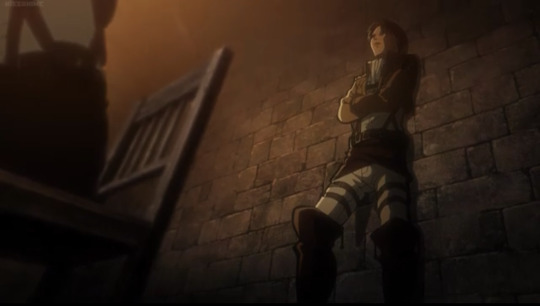

This impression continues when Eren meets Levi and Erwin in the dungeon. Levi is rude and mouthy, and Erwin’s chastisements do little to curb this. Levi’s confidence and skill give him authority issues…right?
So then we move to the courtroom scene, Eren’s trial. Erwin says beforehand that he has a plan, but we’re told nothing more. We see him propose to the court that Eren be given to the Scouts, and he says nothing more.

Levi is the one to scathingly go after the MPs during the debate, pointing out the flaws in their plan and how likely it is that they’re trying to save their own skin. First time viewers might assume that, again, while Erwin is a charismatic leader, he doesn’t go far enough. Levi is the one to say the quiet part out loud, to go to the places Erwin’s too ~respectable~ to go.
Then things start to go sideways. The court’s favor seems to be turning against Eren and the Scouts, fear and paranoia winning out. Eren is getting desperate.
Enter Levi.
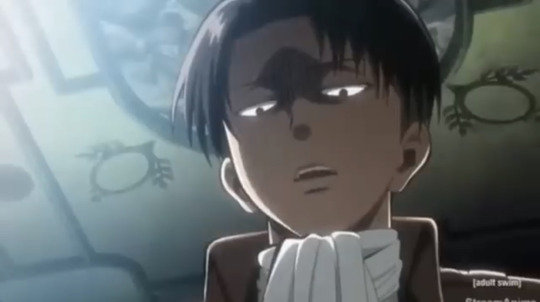
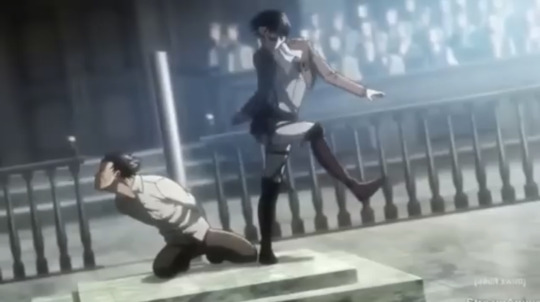
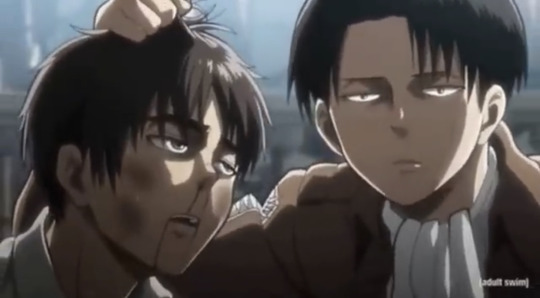
And we get this glorious scene. Levi convinces the court that Eren is harmless to the likes of someone like him. Their best bet is to do what Erwin asked and give Eren to the Scouts. Please.
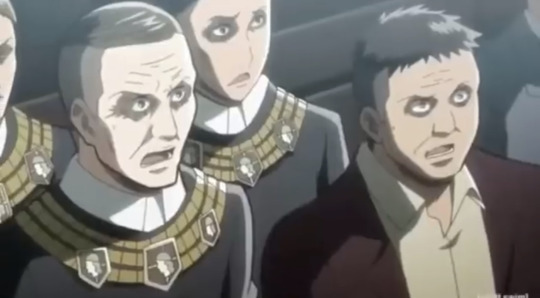
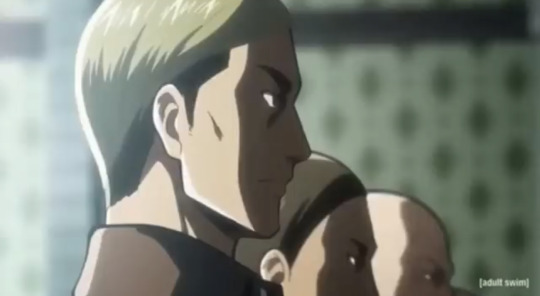
(Notice how Erwin is not shocked, nor does he try to stop Levi.)
Now again, to a first time viewer, this scene feeds into our preconceived notion of Levi. He’s the guy who isn’t deterred by silly things like rank or authority. He saw that things weren’t going Erwin’s way, so he took matters into his own hands. Maybe Erwin will be mad about this later, but Levi will shrug and roll his eyes and say “but I got results, didn’t I?” and Erwin will have no argument for that.
…Right?
Cut to the next scene, after the court has granted the Scouts custody of Eren—and Erwin’s like, “sooo…sorry about that. We had to make it look good.”
This whole thing was planned by Erwin.
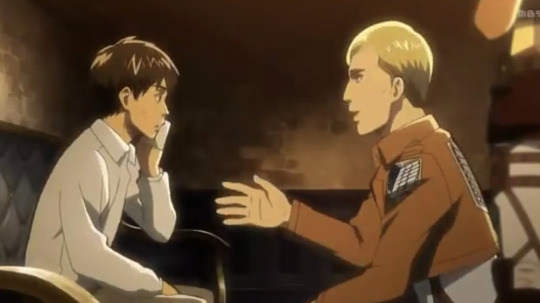
The scene was more or less staged by the Scouts. Erwin wanted to present himself as the calm, collected leader with clean hands. And Levi was the one to do the dirty work, be the brutalizer—even though it was all on Erwin’s orders.
He’ll play that role. He’ll be the rogue, the rough one, the problem child, because his personality fits so well into that niche anyway. But he does it because Erwin wanted him to. If Erwin had wanted him to stand nice and quiet the entire time during the trial, if that’s what needed to be done, Levi would’ve done that instead. He’s not looking to get results; he trusts Erwin’s methods and does what he’s told.
And in this case, he was told to beat up this helpless brat. Gladly.
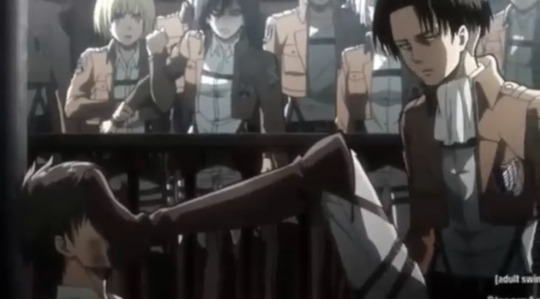
(How much do you want to bet one of the MPs said to Erwin after, “you need to keep your dog under control.” I would simply implode.)
Like, if this display will land anyone in trouble, it wouldn’t be Erwin—it would be Levi. Levi’s the one who got violent and mouthy during a military trial. He broke rank. He attacked the defendant. Erwin isn’t, ostensibly, responsible for this at all. Levi willingly put himself in that position because he trusted Erwin.
And so everything we thought we knew about Levi is turned on its head! Eren even says so in the next episode—he expresses surprise that Levi’s so diligent about following orders.
Eren, silly boy, assumes that being skilled means you don’t have to take orders from anyone. But Levi does. It’s his whole character. (Notice how, despite him ending up being the oldest member of the Scouts, he’s never in line for Commander? He’s the hands, not the head.)
And this whole thing provides so much insight into Erwin’s character as well! Pyxis says at the beginning of the episode that Erwin is very straight-laced. Well, by the end of the episode, we can see that’s…not quite true.
Erwin is conniving, willing to play dirty, do whatever it takes, to get things to go his way. All while keeping his own hands clean, maintaining the image of the honorable Commander. He simply uses the tools at his disposal (Levi) to do the dirty bits for him.
It’s a fantastic introduction to the Scouts, their leader, and his right hand (or is it the left hand that does the dirty work?)
#attack on titan#shingeki no kyojin#levi ackerman#erwin smith#aot#snk#eruri#i am tagging it that but it doesn’t have to be#mymeta#kylerrambles#this of course is not an indictment of either character i LOVE what this says about them!#it’s good character writing!#there! i made a meta post!#feels good to ramble lol
728 notes
·
View notes
Text
cas who abandoned heaven, cas who knows "paradise" is not all it's cracked up to be, cas who--as part of team free will--understands that what they're fighting for is freedom, freedom to choose! not simply the empty promise of "paradise", suddenly deciding that no, actually, this magic baby NEEDS to be born because it will bring paradise on earth<3 (after being staunchly on team "abomination baby needs to die") IS very much sus and people should have been concerned by this sudden shift and it's Not unreasonable to be skeptical or assume some kind of brainwashing. like dean was acting very reasonable and logical and had every right to be suspicious of jack and his intentions because from where he's standing he just saw his best friend do a complete 180 on everything he stands for and believes in after an immensely supernatural being (with powers to rivial god's) just made contact with him. everything abt dean's attitude and wariness toward jack in s12 and the very beginning of s13 is a totally reasonable response, not even counting in the added grief he experiences in early s13 after losing cas, mary, and crowley. i think any rational person would be a little skeptical and untrusting in his same situation. extremely powerful supernatural being whose intentions are unknown and there is no way to stop said being if they turn out to be malicious? and they just seemingly changed your best friend's mind with just a touch? yeah i'd have my guard up!
but anyways, all of this also reveals some juicy things about cas. because if it wasn't (at the very least some low-level) brainwashing, then that means, cas sees a vision of a hypothetical future where he's with dean (cas shirtless, dean looking up, "thank you" etc etc) and he's ready to abandon his beliefs about heaven and paradise to ensure that future comes to pass.
and, because my adhd brain is weaving threads together, i'm also thinking about the 15x20's fake heaven and "cas helped" and how TO ME, that's another red flag abt that heaven being sus. because what we know about cas is that he stops believing in heaven! heaven is not paradise. heaven is a sham. and i just can't reconcile with knowing that it's always been freedom over paradise for team free will, and then just accept that cas (and even jack) would think a "new and improved reformed heaven" would be a good ending in any way. like you're telling me "cas helped" meaning he's ALIVE and out of the empty and he DIDN'T show up to save dean from bleeding out on that rebar? unimaginable.
and even with cas abandoning his beliefs for jack's visions of "paradise", that paradise was still EARTH. still alive. cas would never choose a heaven "happy ending." he would not have a hand in creating that.
anyways, needed to talk abt these two things so i married them into one post. but yea dean was not wrong to be sus of jack at the start. cas suddenly being pro-paradise is very juicy depending on how one interprets the "brainwashing", and lastly, happily-ever-after-heaven has never been the end goal for team free will. they wanted freedom! they wanted to live! cas would Not have a hand in building them a new prison!
94 notes
·
View notes
Text
Jon Snow certainly has a type, but it's based on personality not on physical looks. The two girls we see he has taken an interest at, Ygritte and Val, couldn't look more different. The first is short, skinny girl with a round face and a shaggy mop of red hair. The second is a slender girl with full blossom, high sharp cheekbones and honey colored hair. What do they have in common? Both are brave and fierce.
So the mentality that "Jon Snow only likes redheads" is a misconception that has no canon basis. After all, Jon meets another woman with red hair after Ygritte's death, Melisandre, and he at best tolerates her presence on Castle Black.
As for Ygritte, it's not her red hair the trait Jon likes about her. He does mention that the freefolk consider her a great beauty because of her hair but himself only started to like several aspects of herself- physical traits included- as he got to know her.


(ASOS, JON II)
82 notes
·
View notes
Text
The dismissal of Camila Dunne as a 'mary sue' deeply bothers me, when you've been in fandom for as long as I have and seen people grab a white dude with honestly 5% of her depth and run with it. Sidelined male characters are given complex inner lives, but a woman who displays MANY conflicting traits on screen and has motivations of her own cannot be anything but a cookie-cutter "too perfect, not realistic" characters.
Camila is loving, caring, maternal. She's also the child of immigrants and has the "stick by your man" mentality we see ingrained in latin america sexism, she won't drop the bone even if it hurts her because being the "divorced woman" is simply not a possibility that ever crosses her mind, its seen as a moral failure on her part. Which incidentally happens to line up with Billy's own morality issues and how he doesn't want to be a deadbeat dad and how they stay in this loop, feeding each other's insecurities but also helping each other. She's goal oriented and stubborn, she loves photography and is very talented at it, she resents being reduced to the "mother" and sidelined even as she loves her child more than anything, she wants to be desired and she's willing to cheat for that, even if she regrets it later, she's forgiving, but she's not willing to let Billy's ludicrous fantasies and insecurities get in the way of her happiness.
Like?? HOW is this a Mary Sue. You don't have to like her, but put some respect on her name.
#daisy jones & the six#daisy jones and the six#camila dunne#i love her loads and i AM a billy x daisy shipper#a hardcore one#but Camila's mess with Billy is exactly what makes it so compelling#also Camila and Daisy putting up fronts and these fronts getting bought by the fandom will never not be funny#considering they're the exact opposite of what they want us to see#mymeta#i guess
73 notes
·
View notes
Text
Spy x family thoughts that I cannot stop thinking about
- "papa is a liar" (affectionate)
- the expected "spy needs a fake family" trope being flipped on its head and subverting the dynamics of the inherent power imbalance by virtue of a different kind of information asymmetry. It's like everyone is trying to play 5d chess blindfolded in good faith, but what most of them don't yet know is that the youngest and seemingly the most vulnerable member of their game has actually taken off the blindfold and replaced the chess board with uno.
- the family consists of the only people in that universe who can keep up with each other naturally and without compromising their own sense of self. Power family ahhh
- spy x family is to the spy genre what addams family was to the family sitcom genre. Get in losers, it's time for a new normal
- the very epitome of "everyone in this family is an outlier" so every time a normal person interacts with them, by virtue of majority rules, the normie starts to look around and question "... wait, am I the problem??????? This is weird, right????!" But no one validates that sentiment. Bless
- "Anya williams. Anya levski. Anya roche. Anya klein."
- Anya Forger.
- E L E G A N T!!!!!!!!! 🦢 🎩
476 notes
·
View notes
Text
Yeah, no, as a saundreas shipper I cannot fucking relate to the people who want to strip Andreas of his own agency and pin all his negative characteristics on Rosalind so you can indulge in overglorified yaoi, completely ignoring the repackaged misogyny of it all.
I hate the general headcanon that Andreas was under mind control and that's why he couldn't reach out for Sky. You're telling me Andreas, who says "I don't know whose unbalanced piece of shit this is", meaning Sky, was longing to be a dad all these years? You think it was Rosalind's boot on his neck that had him happily gloating to Saul about "only one of us is in chains"? You think Ros asked him to burn down Saul's house?
Andreas. Was. A. Bad. Person.
Make your peace with it babe, he was a bad father, he lied to Beatrix for sixteen years about what happened in Aster Dell. He turned his back on Sky when he was a baby, before Aster Dell. Then he turned his back again when he didn't come to collect his son after "dying". And then he turned his back on Sky for sixteen fucking years and happily raised a daughter. He came to school and promptly ostracized Sky, made sure to demean Sky's mentor at every possible opportunity.
And then he went and risked it all for his adopted daughter. Was ready to kill and die for her. He died to save his estranged best friend, he died because Beatrix was already dead and there was nothing for him, he died so his son wouldn't have to kill his real father, he died because he was living on borrowed time and he had been dead already for sixteen years.
This is range, it's a complex character, with multiple motivations and flaws and good qualities. He's reckless and incompetent and cruel, and he's loving and loyal to the point of being self sacrificial. He was a bully and he was a victim. But no, let's make him a poor baby angel and put this all in Rosalind.
#BIZARRE moment where the writers!!! give you a well written characters and you're like no we don't do that here#we want the CW flavor of men#fate the winx saga#mymeta#i had a second too long to think about andreas and his relationship with fatherhood and then i got angry that no one ever talks about it
17 notes
·
View notes
Text

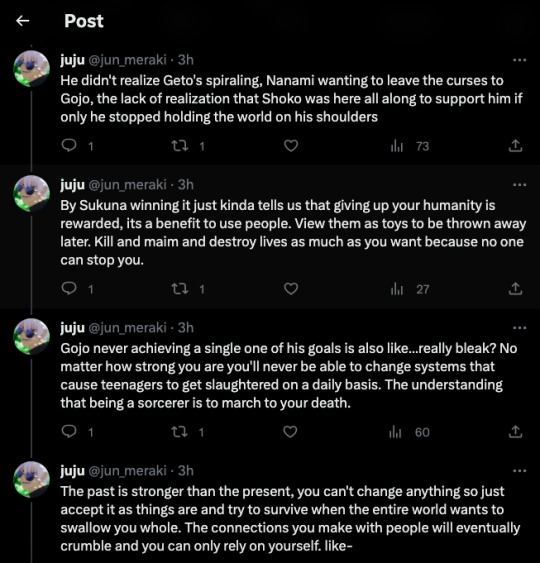

carrying my thoughts about jjk326 on here because I'm going insane
8 notes
·
View notes
Text
Love how Will's "I met the most lovely couple and they invited me for a threesome!" is played for the shock-value laugh, with a secondary layer of confirming a queer side-character in an episode already highlighting Trent and Colin's queer experiences.
But the third layer is that he says this to his mom. Like yes, that adds to the humor, but in a show largely about absent and abusive fathers - as well as complicated mothers like Rebecca's - it made me all warm and fuzzy to see that kind of relationship casually dropped into the end of an already intimate episode. Will is apparently so close to his mom that he doesn't just update her on the after-game Jazz club adventure, but throws out a threesome offer without a hint of fear or judgement or hesitation. Sorry, mom, where was I? Oh yeah, threesome! Based on that line alone, we can infer that Will knows his mom has his back, is completely accepting of his identity, and they have a bond where, I imagine, very little is kept secret between them.
It's such a great bit of characterization and a wonderfully wholesome detail to throw into an already wholesome episode.
1K notes
·
View notes
Text
Defining Ineffable Love (or, Aziracrow Learn the Rules of Romance)
(In response to this ask about ineffables and asexuality)
One of the major threads this season was Aziraphale and Crowley asking themselves what exactly is their relationship. Not what it is in terms of how much they love each other. (That's a given.) But what it is in terms of the human implications of their love.
Crowley and Aziraphale definitely come at the relationship with different perspectives, in terms of what they’re willing to admit to the relationship being. I don’t think we can entirely interpret it in human terms.
–David Tennant (source)
For 6000 years, they’ve never put a name on their relationship. They didn’t, because they’re inhuman, genderless, sexless beings and they didn’t grow up (as it were) with labels. And even when they did learn them, they couldn’t say it was love, because admitting that was a death sentence.
All of Aziraphale’s heart eyes and pining could live comfortably in his mind if he never admitted what that said about him as an angel (trauma compartmentalization). Crowley tries desperately to be cruel and nasty to add white noise around the blatant reality of his constant loyalty to Aziraphale. If you don’t put a word to it, it’s not real and they can’t punish you.
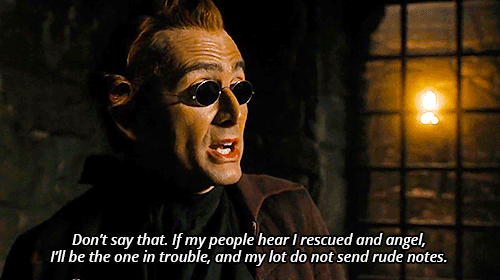
After the Not-pocalypse, for all rights and purposes, Aziraphale and Crowley chose humanity as their identity. We see Aziraphale “playing house” in various human roles (as a landlord, a private eye, a magician).
We even see Crowley intentionally taking on human behavior to handle emotional issues: “Just breathe, that’s what humans do.” They’re slowly and intentionally enculturating themselves into the world they want to belong––earth.
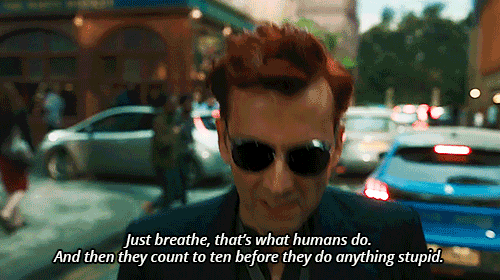
Yet it’s setting up Maggie and Nina that makes Aziraphale and Crowley start thinking about their relationship as a human construct.
Because fundamentally, Aziraphale and Crowley are not human. Like Neil Gaiman tells us constantly, they can’t be defined in human terms when it comes to gender and sexuality. They can shift and move through each and any of those markers at will, purely for the pleasure of the thing: “angels are sexless unless they really want to make an effort.”
IMO that makes them originally asexual, in the sense they were created without the need for sex. And it makes them fundamentally transgender and genderfluid, because while on earth, their sexless, eldritch spiritual bodies take on human, gendered forms and clothing. What gender (and sexuality) they identify with while on earth varies through the eras. Crowley definitely has a fluid gender identity, while Aziraphale appears to have settled on gay man (aka THE southern pansy) for his internal typology (although all of these identities are subject to change).
In the midst of all this fluidity, it’s no wonder Aziraphale and Crowley haven’t thought of their relationship in human terms before. There’s just so much different in them and their bodies than what they see in humanity. And there are no books and songs that show the kind of love they have, in the malleable, sexless bodies they have, with the background they have; it’s all ineffable.
Aziraphale and Crowley didn’t start out thinking they were in a romantic relationship. Whatever feelings they had were long repressed, redefined, and shuttled away. But they did love each other, without question. And it was that love which scared them, because it was bigger than anything they saw among humans, a love that was beautiful and blasphemous and unfathomable.
Kinda like what David Duchovny said about Mulder and Scully in The X-Files, “I don’t know if they’re in love. In a way, their relationship is deeper than that, because they cannot live without each other.”
Now take this profound, ineffable love and drop it into the little boxes and labels human culture has created for itself.
Full disclosure: I’m an asexual demiromantic person in a queerplatonic relationship, so I’ve done a fair bit of research on what romance is and how the rituals of romance are, in many ways, social inventions that vary from culture to culture. There’s love and then there’s romance, and they don’t always overlap. So my interpretation of Aziraphale and Crowley comes through this lens and the fact that Neil Gaiman has affirmed the validity of an ace-spec reading on our ineffables.
Which brings me back to my thesis: That only now are Aziraphale and Crowley thinking of themselves as a romantic couple, precisely because they are interfacing with humans and taking on their social rules.
I like this one asexual person’s description of their experience, which feels very much like our ineffables (from a very good article, I def recommend):
If there is a border between friendship and romance, then in my internal landscape, it goes right through a misty forest where no one has ever bothered to place signs....
Neither of us had intended to start anything even vaguely romantic, but the activities we did and the intense kind of immediate connection we had was coded as romantic in our culture.
That’s what Crowley realizes when Nina confronts him about his relationship to Aziraphale.
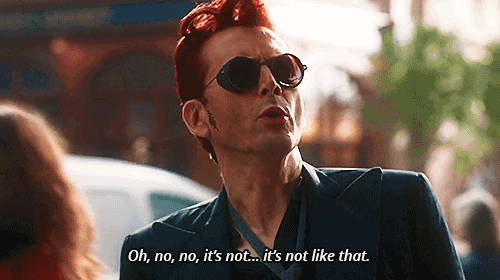
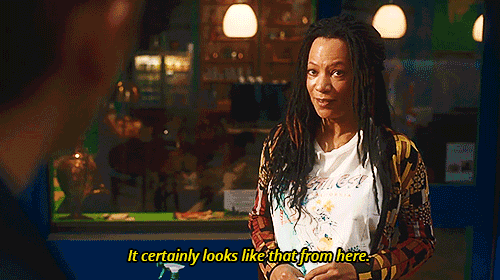
“It looks like that from here.” What Crowley and Aziraphale share is beyond definition, but Nina cannot imagine the anything beyond the human labels she was taught. The tragedy of an everlasting love is that it can only be conveyed properly to other humans if it is cast in such small human words––partner, boyfriend, husband.
Because when Crowley denied those human roles for Aziraphale, Nina slid down the path of thinking Aziraphale was just his “bit on the side,” because there were no labels left she could imagine for them. If you don’t put a word to it, it’s not real.
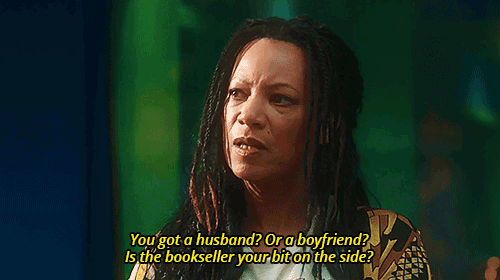
That’s the purpose of labels, to culturally validate a person's identity. Labels, of course, DO NOT create reality; people's experiences are always real, in all their varied ineffability. But labels allow a space for culture (ie other humans and political and legal society) to recognize formally your lived reality.
So Crowley started really thinking about him and Aziraphale, about the ineffable love between them and realized that in human terms, those would be the things he’d call Aziraphale, because those were the words that gave Aziraphale that place of importance in his life.
But with that realization comes all the human trappings and behavioral patterns around those words (the candlelit dinners, dramatic rescues, drinks at the Ritz, etc.) which Crowley had never thought of before, and yet… maybe romance is what he and Aziraphale have been doing all along.
That’s why this season centered so much around Aziraphale and Crowley using cultural artifacts (film and literature) to understand romance, because romance is so deeply socially-defined.
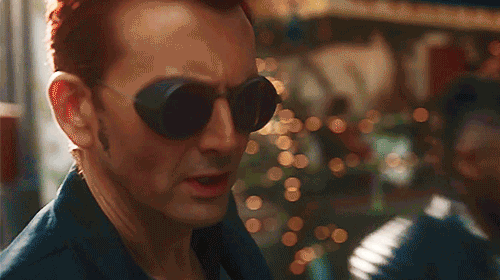
Aziraphale himself has been leaning hard into the romantic social cues (he’s more well-read in the cultural trappings of romance than Crowley is), especially post-Blitz. But when he watches Maggie and Nina dancing, he works up the courage to do something with Crowley that’s even more explicitly loaded as “traditionally romantic” than anything he’s done up to that point.
Because while risking their lives for each other and defying everything for each other is love in its purest form, dancing (specifically in Jane Austen’s world) is a public performance coded for potential marriage partners. It's an intimate ritual of the entire body. (And in British slang, dancing has been used as a euphemism for sex.)
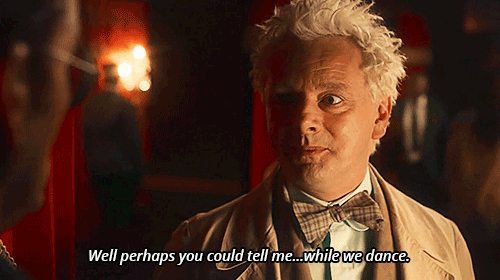
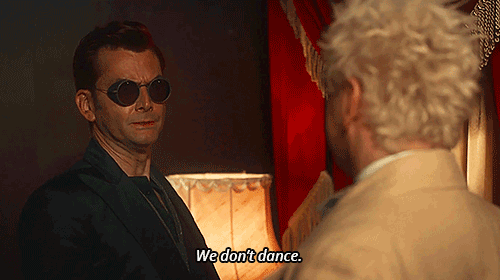
Crowley's "We don't dance" is really telling, because it shows Crowley’s awareness of the unknowable devotion between them vs the human roles Aziraphale is asking him to fill, specifically its physical aspects. Aziraphale is asking to make their relationship more public, more physically explicit, more coded as romantic in a setting specifically intended to couple individuals.
While Maggie and Nina inspired Aziraphale to progress their relationship into a publicly physical direction, Maggie and Nina inspired Crowley to think of the emotional implications of their human roles: the commitment, security, and monogamy of a husband, a partner, an us.
That’s what he decides after Maggie and Nina confront him in the end. “You never say what you’re really thinking.” He wants to codify his relationship so they each become responsible to one another. Aziraphale has always been his soulmate, the one he could always rely on. But he wants to place a word and a role to their love that will bring with it Aziraphale’s commitment and dedication to him.
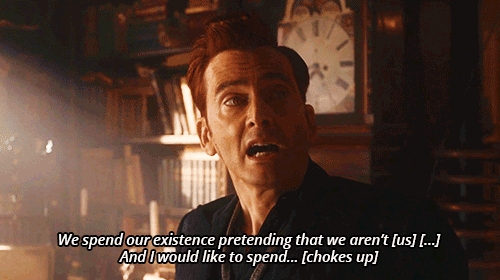
And that's another reason why Crowley kisses Aziraphale, because he knows Aziraphale was willing to make their relationship physical, and he wants that, too. To consummate this bond in the way humans do.
But Crowley doesn’t really know how to kiss; he’s not as worldly as he makes out to be. (It’s Aziraphale who owns the gun, and Crowley who’s never fired one.) He uses the kiss as a tool to get across to Aziraphale what he wants for them, in the physical language Aziraphale has been using, because "one fabulous kiss and we're good," right?
But it doesn’t work, because real life and real emotions don’t work like that; life and love don’t follow a script, despite the novels and plays and songs.
Aziraphale and Crowley spent this entire season trying to figure out what their relationship is and what they wanted out of it, trying to make sense of the unfathomable thing they share and the human implications of it, and not quite landing on the same page.
Part 2 of this Analysis, covering a correction in Crowley’s statement (“You don’t dance”) and the further implications of dancing/sex.
#please see the part 2 listed at the end for an analysis Crowley’s “you don’t dance#good omens#good omens 2#ineffable husbands#go s2 meta#go meta#good omens meta#queer#asexuality#asexual#aromantic#genderfluid#gos2spoilers#go s2#good omens 2 meta#ineffable romance#*mine#*mymeta
2K notes
·
View notes
Text
can you imagine you're finding your footing in academia, are engaged to be married to the love of your life, have your entire life ahead of you... and it gets flushed away in an instant because you wanted to put on this silly thing you bought to make your future wife laugh a little? can you imagine experiencing the slow grueling process of ego death, knowing you are losing yourself and your entire identity bit by bit but you can't not put the damn crown on because how else are you going to protect this helpless little girl you've grown attached to? you have no one else to speak of - they all died in the apocalypse after all.
can you imagine fleeting sensations of lucidity on and off for centuries, thinking maybe this is finally the time you can get a grip long enough to try to figure out a way out of this hell?
can you even fathom snapping back to your full conscious identity in an instant in this fantastical, alien world you are far too old to hope to adapt to in a meaningful way in a long-term sense? what about spending the next decade+ suffering with unprocessed trauma that pathetically few could even begin to relate to? or having your entire existence become an attraction for others' entertainment and amusement? hell, even if you die, you won't see the love of your life in whatever afterlife your soul inhabits.
if I were Simon, I don't see myself doing much better.
363 notes
·
View notes
Text
on the 7seas mxtx english editions
I have been struggling to write this since December. I still don’t really know where or how to begin, but the recent announcement of 2ha’s English licensing by Seven Seas seems as good a motivator as any at this point.
I guess before I begin, I want to make clear that I am not writing this with the intent or desire to harm—it’s certainly a criticism, but I want it to be a practical one. Please don’t use my words as an excuse to take up arms or make personal attacks. I don’t want to be used as a prop in anyone else’s fights, I don’t wan to talk about it, I just want to say my piece and be done.
So. Without mincing words: I am beyond disappointed in the MXTX English-language editions. The idea that this might be what sets the precedent for future danmei releases is incredibly disheartening. There are several reasons, and I’ll try to explain my main issues as best I can without being unnecessarily harsh. I will be talking about specifics with regards to MDZS, as it’s the one I’m most familiar with.
Quality & Production Timeline:
The overall quality of the work is lackluster and rushed. Several reviews have already discussed issues with the MDZS translation that was published—they are easy to find on Goodreads and elsewhere, but I am not going to link them here because I feel that relitigating details and pinning blame on the translator(s) is very misguided. The licensed translation is full of mistakes (both major and minor), inconsistencies, and confusing wording. To me, this betrays a very serious lack of editorial oversight and quality checking rather than a problem with the raw translation itself. No translator on earth can produce a first draft without mistakes, yes, even very basic ones. Everyone slips up, even in their native tongue, all the time. Having mistakes in an early draft is not at all an indication that a translator lacks skill, and this persistent focus on the faults of the translator(s) feels more like scapegoating than anything. I may not agree with all of the translation choices, but I do not think that mistakes make the translator(s) unqualified.
What I find unacceptable is that these mistakes were allowed through into the final printing, which tells me there was insufficient, if any, review of the content, either by the translators, or by another party familiar with the original work. The production timeline feels very, very short for such a project (I cannot even begin to imagine trying to translate 32 chapters of MDZS in under four months), which maybe explains, but doesn’t excuse. I am not intimately familiar with the publishing industry, so I will refrain from speculating further, except to point in the direction of both Suika and Pengie’s threads on the matter:
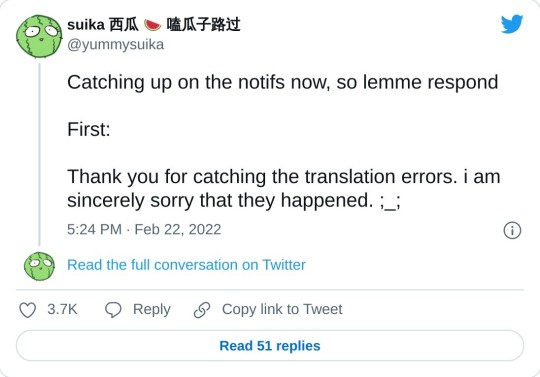

If the books needed more time to be done well, then they should have allotted more time. The translators should not be bearing the brunt of the criticism. It isn’t fair to them—and it isn’t fair that the publication schedule and process set them up for failure in this way.
Pronunciation Guide:
This is perhaps my most serious grievance, and the one that’s kept me from writing this for four and a half months. I know that my reaction is personal and extreme, but I also think that it has roots in something that is both real and actionable. Forgive me, this will be harsh.
When I saw the pronunciation guides in the back of all the books, I felt physically ill.
It reads like an echo of all the times I’ve had my “difficult” language used against me, but this time packaged up as a pseudo-helpful, sightseeing brochure to make English speakers feel good about themselves when confronted with supposedly “difficult” content. They are condescending, touristy, and teach a bastardized, hyper-Americanized anglicization of my first language. The pronunciations, as they are written, sound exactly the way a classmate used to harass me by following me around, mocking my name, and pulling at the corners of his eyes. They are worse than useless.
These guides are not only disrespectful to people like me, but also disrespectful to the English speakers who put their trust in this production based on the marketing that implied there would be careful consideration of the cross-cultural challenges involved. When there was so much reassuring from the publisher that these books would be done right, that the production would be handled with respect and understanding, the inclusion of these guides was particularly insulting. Much has been made about how they are inaccurate—which they are. But what’s more egregious is their tone, their technique, their application.
Mandarin pronunciation can be challenging for English speakers. I am not contesting this. But I ask—what was the purpose of these guides? “[Mandarin] is a tonal language,” they read, “so correct pronunciation is vital to being understood!” But there is not a single further allusion to tone within the guide, and the pronunciations that follow are not, in any way, going to help a reader new to the language pronounce anything well.
Obviously, two-page pronunciation guides cannot be a substitute for language instruction—but then they should not make any pretension to be. I cannot see these guides as anything other than a way to pander to the egos of English speakers, to simplify and make palatable this language that might make them uncomfortable with its difference. These guides promise knowledge on culture that they don’t deliver, and instead mislead readers with racist caricatures of the language.
Lest this is met with responses along the lines of “but it’s hard to create a pronunciation guide” and “it makes the book more accessible”—1) of course it’s hard. So what? Doing it badly was worse than not doing it at all. 2) No, it doesn’t. Misinformation does not increase accessibility.
There was every opportunity to create something respectful and sincere. Many people have pointed out that the Pinyin system is very serviceable and consistent. If it wasn’t feasible to include a basic guide to Pinyin in the books, perhaps there could have been a space for “Additional Resources” instead, providing links or references to places where a reader could seek out that information if they wanted it. We live in a multimedia world. Several fans, including myself, have made audio pronunciation guides—something like that, more professionally produced, might have been an option. There was room to allow readers to explore and learn and put in effort to engage instead of spoon-feeding them this slapdash, half-assed bullshit.
I can believe that it was done with the best of intentions. But that doesn’t make it good.
Marketing:
This leads into my final point, which is a bit more nebulous and hard to explain, but I’ll try.
The inclusion of guides beyond a pronunciation guide and glossary was also insulting, in a different way. Why is there a need for a character guide? Can readers not be trusted to read? I might understand an inclusion in later volumes as a refresher, but it’s baffling to me that these guides are considered necessary at the outset, and it’s also frustrating to see that they contain interpretations of characterization and motivation. “The identity of certain characters may be a spoiler; use this guide with caution on your first read of the novel.” Why include it at all?
As a reader, I do not want to be told how to understand the text. The text can speak for itself without an external party setting the tone. These stories are not more complicated just because they are Chinese. Harry Potter didn’t come with an extensive list of characters and the meanings of their names. And those were books written for children.
MXTX’s works are adult books. They are adult books, but everything about their marketing in English feels like they are aimed at teens that the publishers don’t think are very smart. Yes, the stories may be culturally unfamiliar, but that doesn’t mean readers need to be hand-held with cutesy lectures. To do so feels like it says something less than flattering about the publisher’s perception of MXTX’s work and audience.
-
When the English licensing of MXTX’s works was first announced, I admit my first reaction was despair because I was so afraid of the consequences, of what unintended collateral damage the final product might generate if it fell short of a very high standard—for the translators, for MXTX, for the greater danmei genre. It’s difficult to be the first, and it’s difficult to be the first with such high stakes. And unfortunately, here we are, and it played out nearly exactly how I had predicted and hoped it would not.
I am not unbiased, and my views certainly reflect that. It is possible that some of my criticisms are excessive or unsympathetic. However, I have spent a long time thinking this over and attempting to put it all into words, and I would appreciate having my criticisms considered seriously, even if you eventually decide that you disagree with them. But I am tired and I am terribly sad that something I loved so much was handled in a way that felt so disrespectful. How can I be excited about the English releases of these books if I can hardly bear to look at the copies on my shelf? Unless a lot changes about the future installments, I cannot view any English licensing announcements with anything but bitter disappointment. I have no trust left to give, and no heart to spare.
It’s fine if you love the English editions of these novels. I don’t want to take away your joy because it’s a wonderful thing to have. As always, all I’m asking for is serious consideration. If I’ve made you see things in a different light, that’s as much as I can hope for.
731 notes
·
View notes
Note
Was Maes Hughes a good man? Was he a bad man?
Consider the evidence we have.........
Loaded question! I feel like the obvious answer is “yes!” because who doesn’t like Hughes? Who isn’t gutted by his death? Who doesn’t get sad thinking about his daughter growing up without the father who loved her so much?
But we also have to consider that Hughes canonically took part in the Ishval extermination—in other words, war crimes. The man’s a war criminal and a murderer. Even in the 03 version, where he states he took a desk job rather than participate in the massacre, he knew about the killings and did nothing to stop them. Complicity.
So then our answer should be “no,” because he Does Bad Things in canon. And—so does Roy Mustang. So does Riza Hawkeye, and every state alchemist and almost every enlisted soldier at the time of the war. They’re all part of a machine that steps on people. Slaughters then mercilessly when it’s deemed necessary. And anyone who follows those orders without question is, by definition, a bad person.
I’m not breaking new ground by saying this, and I’m far from the first to talk about the Amestrian military being almost entirely comprised of war criminals. But honestly? Whether or not someone is a “good” person is…such a boring question to me. The far more intriguing question is “Is Maes Hughes a good character?” And the answer to that is yes.
He’s a good character because he haunts the narrative. Because his death causes more ripples than his life. Because his friendship to one man helped cause the downfall of the regime he served, the regime that made him culpable in a genocide.
He’s a good character because, in the Conqueror of Shamballa movie, he makes us as viewers uncomfortable because he’s a Nazi. He’s complicit in that system of oppression as well, one that we’re far more familiar with. It might make viewers angry, make them decry the movie as bad because “ugh not my boy Hughes he would never!” Uh…he did. In his world, he did. In fact, in CoS, he is better than his Amestrian counterpart, because he denounces and leaves the party before they do anything more than shoot up a beer hall. Not a completely bad person, after all, so it seems.
#asks#anon#mymeta#i hope i articulated my thoughts well enough#like make no mistake i LIKE hughes#and i’m not gonna denounce him because he does bad things#but the bad things are connected to the narrative themes!#i have to talk about them!#fullmetal alchemist#maes hughes
14 notes
·
View notes